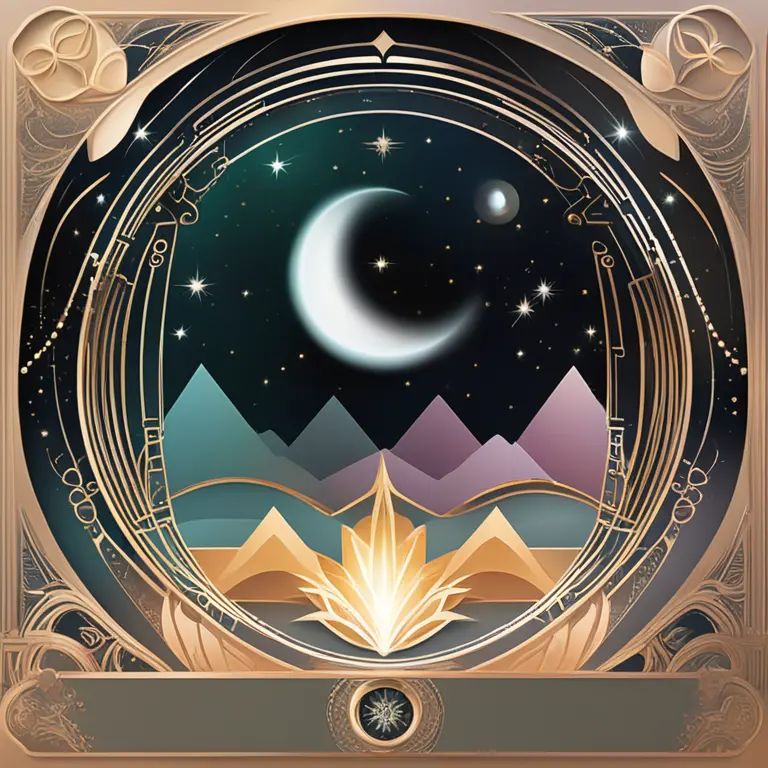
The Moon Phase During a Lunar Eclipse
An informative guide on the specifics of the moon phase occurring during a lunar eclipse, with relevance to astrological interpretations.
article by Priya Deshmukh
Introducing Lunar Eclipses
During a lunar eclipse, an enchanting celestial dance unfolds in the night sky. This phenomenon occurs when the Earth aligns between the full moon and the sun, casting a shadow that temporarily cloaks our lunar companion. An eclipse can only happen when the moon is full, as it's the only phase when such an alignment is possible. It's a time of powerful astrological influence, believed to bring about changes and revelations in our lives. Now, let's demystify the phases and energies associated with a lunar eclipse.

The Full Moon's Role
A lunar eclipse is invariably linked to the phase of the full moon. During this time, when the moon is fully illuminated by the sun, its energies are at their peak. Emotions can run high, and in astrology, the full moon is often associated with a culmination or a climax in personal and collective narratives. The full moon phase is considered a time for harvest, reflection, and release, which is further amplified by the transformative energy of a lunar eclipse, suggesting potential for significant shifts in 2024 horoscopes and beyond.

The Shadow's Influence
During a lunar eclipse, the Earth's shadow has two distinct parts: the penumbra and the umbra. Penumbral eclipses are subtle, as the outer shadow causes only slight dimming of the moon, often going unnoticed. By contrast, umbral eclipses are dramatic; the Earth's central shadow can create a total or partial eclipse, with the moon taking on a reddish hue, commonly referred to as a "Blood Moon." Astrologically, this can signify an intense period of emotional introspection and transformation.

Cosmic Energies of Eclipses
Astrological traditions pay special attention to eclipses, seeing them as potent catalysts for change. In particular, Lunar eclipses are considered times to let go of past patterns and embrace new beginnings. The energy experienced during an eclipse can initiate shake-ups in various areas of life, from relationships to career paths, which are often highlighted in astrological forecasts. As we approach the next series of lunar eclipses, those attuned to the cosmic energies expect pivotal moments and guidance for personal growth.
Interpreting Eclipse Events
Going beyond the physical phenomena, lunar eclipses carry profound significance in horoscopes. For instance, an eclipse in 2024 occurring in a specific zodiac sign can spotlight areas related to that sign's qualities or house associations. An eclipse in Taurus might magnify matters of security and pleasure, while one in Scorpio could bring hidden truths to light. It's the astrologer's role to interpret how these cosmic events might influence individual or collective experiences, based on their timing and placement.
Eclipses as Astrological Milestones
Important to both astronomy and astrology, lunar eclipses serve as celestial milestones that punctuate our journey through life. Astrologers suggest marking these dates as opportune times for reflection and intention setting. With their cyclic nature, lunar eclipses offer us regular intervals to review our paths and make adjustments, playing a crucial role in our personal evolution and the unfolding of our destiny.
Published: 1/19/2024
Modified: 1/19/2024
More predictions
Come back here soon to learn more about yourself and your future


Moon Phases: Celestial Dynamics and Impact
Discover the intriguing facts about moon phases and their significance in celestial dynamics, astrology, and personal biorhythms.


Moon Phase Soulmates: Cosmic Bonds in Love
Discover the enchanting connection between moon phases and soulmate relationships in this insightful article on cosmic synergy in love.


The Precision of Moon Phase Watches: A Detailed Review
Delve into the world of astronomical timepieces as we discuss the accuracy of moon phase watches and their place in the realms of timekeeping and astrology.